Environment

AI data centers are reviving obsolete ‘peaker’ power plants in Chicago; PJM prices hit record cap
By Cygnus | 23 Dec 2025
AI demand revives Chicago’s Fisk peaker plant. NRG delays retirement as PJM capacity prices hit record $333.44 cap, sparking environmental concerns.

Parliamentary panel urges priority clearances for critical mineral projects amid delays
By Axel Miller | 18 Dec 2025
Parliamentary panel flags delays in operationalizing mineral blocks; urges priority clearances for critical minerals like lithium to boost EV and defense sectors.

ACME Solar commissions 52 MW of Gujarat wind project; shares rise
By Axel Miller | 17 Dec 2025
ACME Solar commissions 52 MW of 100 MW wind project in Gujarat, appoints new supply chain chief; stock rises 1.36% to ₹234.06.

Tata Power to Finalize ₹6,500 Crore Wafer-Ingot Plant by January, Deepening Solar Push
By Axel Miller | 16 Dec 2025
Tata Power to finalize ₹6,500 crore solar wafer-ingot plant by Jan 2026; eyes 10GW capacity and backward integration to cut imports.

Indian textile sector struggles with energy intensity despite renewable push: ICRA report
By Cygnus | 12 Dec 2025
India’s textile sector boosts renewable energy use to 18%, but rising energy intensity and low Scope 3 reporting pose risks to global competitiveness, says new ICRA ESG report.

Drax Targets Data Centre Launch at Former Coal Site by 2027 to Feed AI Power Demand
By Axel Miller | 11 Dec 2025
Drax Group plans to convert its Yorkshire coal plant into a 100MW data centre by 2027, eyeing 1GW capacity for AI infrastructure. 2025 profits forecast to hit top estimates.

Court overturns wind freeze, yet solar projects remain stalled under federal review
By Cygnus | 10 Dec 2025
Federal court overturns Trump administration’s wind permit freeze, but solar projects remain stalled under Interior Secretary’s oversight, threatening gigawatts of energy capacity.

India rolls out comprehensive R&D roadmap to accelerate carbon capture technology
By Axel Miller | 09 Dec 2025
India unveils a 20-year R&D roadmap for Carbon Capture (CCUS) backed by ₹1 lakh crore funding. Read about the DST plan, UltraTech/JSW partnerships, and Net Zero 2070 goals.

Tata Motors launches trial runs of hydrogen-powered long-haul trucks
06 Mar 2025
Tata Motors on Friday flagged off the first trial runs of hydrogen-powered heavy-duty trucks in India, in a development that aligns with the country’s goal of net-zero emissions by 2070.

Larsen & Toubro secures $1.5 billion contract for Saudi Aramco’s carbon capture project: report
25 Feb 2025
Larsen & Toubro Ltd is reported to have secured a $1.5 billion contract from Saudi Aramco for construction of the first phase of its Carbon Capture and Storage (CCS) project.
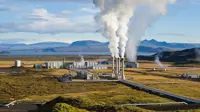
ABB and Sage Geosystems partner for developing geothermal power system for Meta
05 Feb 2025
ABB and Sage Geosystems are partnering to develop Geopressured Geothermal Systems that can generate up to 150 MW of geothermal baseload power for Meta

Anglo American, University of Birmingham to jointly perfect carbon recycling technology for steel mills
24 Jan 2025
Mining and metals giant Anglo American has announced a partnership with the University of Birmingham and industry-promoter Cambridge Future Tech to launch PeroCycle

Biggest IKEA retailer to channel $1 billion into recycling ventures
15 Jan 2025
The investment division of the Ingka Group, recognized as the foremost global IKEA retailer, has unveiled plans to channel €1 billion ($1.03 billion) into recycling enterprises.

Climate talks end with a blunt $300 bn deal; fossil fuels not going any soon
24 Nov 2024
The UN climate summit COP29 in Baku, Azerbaijan took an extra 33 hours to hammer out a deal on climate financing and save the annual summit from certain collapse.

LPG as automobile fuel a solution for Delhi NCR air pollution: IAC
By Venkatachari Jagannathan | 11 Nov 2024
The Indian Auto LPG Coalition (IAC) has stressed that liquefied petroleum gas (LPG) as automobile fuel could be the cleaner and cheaper alternative solution for reducing the air pollution in the Delhi National Capital Region (NCR).

Maersk signs long-term methanol deal for fuelling its container fleet
01 Nov 2024
Danish shipping giant Maersk, part of the AP Moller-Maersk Group, has signed a long-term agreement with LONGi Green Energy Technology Co Ltd
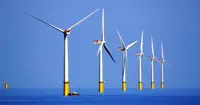
China turns on world’s largest offshore wind turbine with 20 MW capacity
22 Oct 2024
China, one of the largest emitters of pollutant gases, also now operates the world’s largest wind turbine that is capable of generating 20 Mega Watt of clean electricity, which is enough to power 96,000 homes.
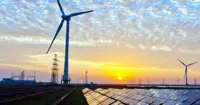
India’s green power capacity hits 200 GW, or 46.3% of total capacity
17 Oct 2024
India has built up renewable energy capacity of more than 200 Giga Watt, which underscores the government’s commitment to clean energy and securing a green future for the country and the world.
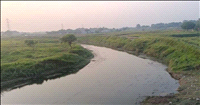
India, Denmark partner to rejuvenate river Varuna
26 Aug 2024
India and Denmark have formed a Green Strategic Partnership under which the two governments will collaborate for establishing a Smart Laboratory on Clean Rivers (SLCR).

Ohmium opens 2GW hydrogen electrolyser gigafactory ner Bengaluru
22 Jul 2024
US-based hydrogen electrolyser maker Ohmium International has announced the launch of its new gigafactory in Doddaballapura, close to Bengaluru.

CMA CGM launches new service connecting Indian subcontinent and US East Coast
18 Jun 2024
French shipping and logistics company CMA CGM on Monday announced the launch Indamex, a renewed shipping service to cater to the rising demand between Indian subcontinent and the US East Coast.

Suzlon to merge wholly-owned subsidiaries, spin off projects business
06 May 2024
The board of directors of wind power pioneer Suzlon Energy Ltd has approved a scheme of amalgamation under which the company will merge its wholly-owned subsidiaries, Suzlon Global Services and Suzlon Energy Ltd, Mauritius, with itself.

SJVN launches India’s first dual-purpose green hydrogen pilot project
29 Apr 2024
State-owned hydro-electric power company SJVN Ltd on Thursday launched a green hydrogen pilot project for combined generation of heat and power at its 1,500 MW Nathpa Jhakri Hydro Power Station (NJHPS) in Jhakri, Himachal Pradesh.
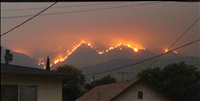
US regulator SEC wants companies to disclose climate impact
08 Mar 2024
The US Securities and Exchange Commission (SEC) on Wednesday adopted new rules that prescribes disclosure norms for companies

CMA CGM to invest $1.6 bn in energy transition fund
26 Feb 2024
Shipping giant CMA CGM has proposed to invest $1.6 billion (Euro 1.5 billion) over five years to create an energy fund to support its planned transition to a zero emission company.
Latest articles
Featured articles

Server CPU Shortages Grip China as AI Boom Strains Intel and AMD Supply Chains
By Cygnus | 06 Feb 2026
Intel and AMD server CPU shortages are hitting China as AI data center demand surges, pushing lead times to six months and driving prices higher.

Budget 2026-27 Seeks Fiscal Balance Amid Rupee Volatility and Industrial Stagnation
By Cygnus | 02 Feb 2026
India's Budget 2026-27 targets fiscal discipline with record capex as markets tumble, the rupee weakens and manufacturing struggles to regain momentum.

The Thirsty Cloud: Why 2026 Is the Year AI Bottlenecks Shift From Chips to Water
By Axel Miller | 28 Jan 2026
As AI server density surges in 2026, data centers face a new bottleneck deeper than chips — the massive water demand required for cooling next-generation infrastructure.

The New Airspace Economy: How Geopolitics Is Rewriting Aviation Costs in 2026
By Axel Miller | 22 Jan 2026
Airspace bans, sanctions and corridor risk are forcing airlines into costly detours in 2026, raising fuel burn, reducing aircraft utilisation and pushing airfares higher worldwide.

India’s Data Center Arms Race: The Battle for Power, Cooling, and AI Real Estate
By Cygnus | 22 Jan 2026
India’s data centre boom is turning into an AI arms race where power contracts, liquid cooling and fast commissioning decide the winners across Mumbai, Chennai and Hyderabad.

India’s Oil Balancing Act: Refiners Rebuild Middle East Supply Lines as Russia Flows Disrupt
By Axel Miller | 21 Jan 2026
India’s refiners are rebalancing crude sourcing as Russian imports fell to a two-year low in December 2025, lifting OPEC’s share and raising geopolitical risk concerns.

Arctic Fever: How ‘Greenland Tariff’ Politics Sparked a Global Flight to Safety
By Axel Miller | 20 Jan 2026
Greenland-linked tariff threats have injected fresh uncertainty into transatlantic trade, triggering a risk-off shift in markets and reshaping global supply chain planning.

The New Oil (Part 5): Friend-Shoring, Supply Chain Fragmentation and the Cost of Resilience
By Cygnus | 19 Jan 2026
Friend-shoring is reshaping lithium, rare earth and graphite supply chains, creating a resilience premium and new winners and losers in clean tech.

The New Oil (Part 4): Can Technology Break the Dependency?
By Cygnus | 16 Jan 2026
Can magnet recycling and rare-earth-free motors reduce global dependence on strategic minerals? Part 4 explores breakthroughs, limits and timelines.









